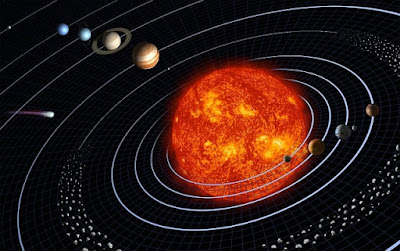"Solar system Solar system, planets spin around the sun. Let us learn about the 8 planets now". Wait, What?? 8 planets? When did this happen? ....
I was taken aback when I heard this rhyme four years back. It was a deviation from what I learnt in school - the Solar system has 9 planets and a Sun. Further into the rhyme, I understood that the one axed from the coveted list was Pluto, the farthest planet from Sun.
Eager to know the reason why? Let's first know a bit about the planet.
A brief history of Pluto:
Before 1926, there were only 8 planets. That year, a lab discovered Pluto, the newest kid in the planet world. However, questions on allocating the coveted 'planet' status to Pluto were raised; but the decision remained undeterred. The planet enjoyed this position for close to 80 years. And then was formed a committee, which proved fatal to the youngest planet's rank.
The 2000s - Era of downfall:
Come 21st century, with the advancements in technology, led to a discovery of new celestial objects.The puzzle: A few of these 'toddlers' were heavier than Pluto, but were still anointed Dwarf Planet. A clear case of non uniformity. So, either these were to be included as planets or Pluto had to move out to be a Dwarf planet. With these confusions creeping in, a body viz. 'Planet Definition Committee' was set up in 2006 by IAU, to put on paper the criterion for defining planets.
The committee defined three conditions for a celestial object to be accorded the Planet status. An object will be called planet if it:
(a) is in orbit around the Sun,
(b) has sufficient mass for its self-gravity to overcome rigid body forces so that it assumes a hydrostatic equilibrium (nearly round) shape, and
(c) has cleared the neighbourhood around its orbit.
And Pluto couldn't 'clear' the third one. By 'clearing' the neighbourhood, it means that the planet has no other object of comparable mass in its orbital region. It faltered at the last hurdle, thereby giving off the coveted position it enjoyed for long. And hence, the books across the world were updated to have 8 planets.
Pluto now is a Dwarf Planet.
Nerd Notes:
1) A Celestial object which satisfies the first 2 conditions but not the third ('clear the neighbourhood') is classified as a Dwarf planet.
2) The term 'Plutoed' is added to the English lexicon, meaning, to demote.
3) Exoplanet is a planet outside of our solar system
4) Rogue planet is an Exoplanet that doesn't revolve around a star (Remember, Sun is a star)
Thanks for reading. Hope you liked the post. Do share it with your family and friends.
Enjoy and shine like a star!


Good research and nicely explained
ReplyDeleteSimple yet sufficient. Nicely done
ReplyDeletewonderfully written !
ReplyDelete